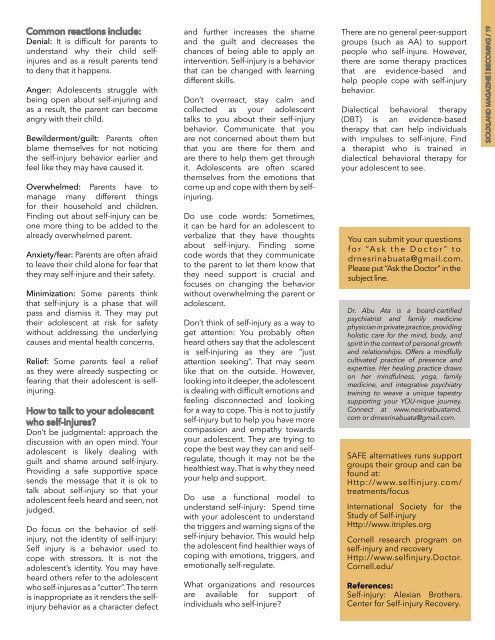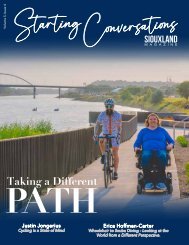Siouxland Magazine - Volume 4 Issue 6
You also want an ePaper? Increase the reach of your titles
YUMPU automatically turns print PDFs into web optimized ePapers that Google loves.
Common reactions include:<br />
Denial: It is difficult for parents to<br />
understand why their child selfinjures<br />
and as a result parents tend<br />
to deny that it happens.<br />
Anger: Adolescents struggle with<br />
being open about self-injuring and<br />
as a result, the parent can become<br />
angry with their child.<br />
Bewilderment/guilt: Parents often<br />
blame themselves for not noticing<br />
the self-injury behavior earlier and<br />
feel like they may have caused it.<br />
Overwhelmed: Parents have to<br />
manage many different things<br />
for their household and children.<br />
Finding out about self-injury can be<br />
one more thing to be added to the<br />
already overwhelmed parent.<br />
Anxiety/fear: Parents are often afraid<br />
to leave their child alone for fear that<br />
they may self-injure and their safety.<br />
Minimization: Some parents think<br />
that self-injury is a phase that will<br />
pass and dismiss it. They may put<br />
their adolescent at risk for safety<br />
without addressing the underlying<br />
causes and mental health concerns.<br />
Relief: Some parents feel a relief<br />
as they were already suspecting or<br />
fearing that their adolescent is selfinjuring.<br />
How to talk to your adolescent<br />
who self-injures?<br />
Don’t be judgmental: approach the<br />
discussion with an open mind. Your<br />
adolescent is likely dealing with<br />
guilt and shame around self-injury.<br />
Providing a safe supportive space<br />
sends the message that it is ok to<br />
talk about self-injury so that your<br />
adolescent feels heard and seen, not<br />
judged.<br />
Do focus on the behavior of selfinjury,<br />
not the identity of self-injury:<br />
Self injury is a behavior used to<br />
cope with stressors. It is not the<br />
adolescent’s identity. You may have<br />
heard others refer to the adolescent<br />
who self-injures as a “cutter”. The term<br />
is inappropriate as it renders the selfinjury<br />
behavior as a character defect<br />
and further increases the shame<br />
and the guilt and decreases the<br />
chances of being able to apply an<br />
intervention. Self-injury is a behavior<br />
that can be changed with learning<br />
different skills.<br />
Don’t overreact, stay calm and<br />
collected as your adolescent<br />
talks to you about their self-injury<br />
behavior. Communicate that you<br />
are not concerned about them but<br />
that you are there for them and<br />
are there to help them get through<br />
it. Adolescents are often scared<br />
themselves from the emotions that<br />
come up and cope with them by selfinjuring.<br />
Do use code words: Sometimes,<br />
it can be hard for an adolescent to<br />
verbalize that they have thoughts<br />
about self-injury. Finding some<br />
code words that they communicate<br />
to the parent to let them know that<br />
they need support is crucial and<br />
focuses on changing the behavior<br />
without overwhelming the parent or<br />
adolescent.<br />
Don’t think of self-injury as a way to<br />
get attention: You probably often<br />
heard others say that the adolescent<br />
is self-injuring as they are “just<br />
attention seeking”. That may seem<br />
like that on the outside. However,<br />
looking into it deeper, the adolescent<br />
is dealing with difficult emotions and<br />
feeling disconnected and looking<br />
for a way to cope. This is not to justify<br />
self-injury but to help you have more<br />
compassion and empathy towards<br />
your adolescent. They are trying to<br />
cope the best way they can and selfregulate,<br />
though it may not be the<br />
healthiest way. That is why they need<br />
your help and support.<br />
Do use a functional model to<br />
understand self-injury: Spend time<br />
with your adolescent to understand<br />
the triggers and warning signs of the<br />
self-injury behavior. This would help<br />
the adolescent find healthier ways of<br />
coping with emotions, triggers, and<br />
emotionally self-regulate.<br />
What organizations and resources<br />
are available for support of<br />
individuals who self-injure?<br />
There are no general peer-support<br />
groups (such as AA) to support<br />
people who self-injure. However,<br />
there are some therapy practices<br />
that are evidence-based and<br />
help people cope with self-injury<br />
behavior.<br />
Dialectical behavioral therapy<br />
(DBT) is an evidence-based<br />
therapy that can help individuals<br />
with impulses to self-injure. Find<br />
a therapist who is trained in<br />
dialectical behavioral therapy for<br />
your adolescent to see.<br />
You can submit your questions<br />
f o r “A s k t h e D o c t o r ” t o<br />
drnesrinabuata@gmail.com.<br />
Please put “Ask the Doctor” in the<br />
subject line.<br />
Dr. Abu Ata is a board-certified<br />
psychiatrist and family medicine<br />
physician in private practice, providing<br />
holistic care for the mind, body, and<br />
spirit in the context of personal growth<br />
and relationships. Offers a mindfully<br />
cultivated practice of presence and<br />
expertise. Her healing practice draws<br />
on her mindfulness, yoga, family<br />
medicine, and integrative psychiatry<br />
training to weave a unique tapestry<br />
supporting your YOU-nique journey.<br />
Connect at www.nesrinabuatamd.<br />
com or drnesrinabuata@gmail.com.<br />
SAFE alternatives runs support<br />
groups their group and can be<br />
found at:<br />
Http://www.selfinjury.com/<br />
treatments/focus<br />
International Society for the<br />
Study of Self-injury<br />
Http://www.itriples.org<br />
Cornell research program on<br />
self-injury and recovery<br />
Http://www.selfinjury.Doctor.<br />
Cornell.edu/<br />
References:<br />
Self-injury: Alexian Brothers.<br />
Center for Self-injury Recovery.<br />
<strong>Siouxland</strong> <strong>Magazine</strong> | BeComing / 19

















